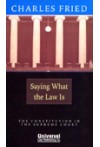- Author(s): Charles Fried
- Publisher: Universal LexisNexis
- Edition: Ed Ind Rp 2008
- ISBN 13 9788175346680
- Approx. Pages 319 + contents
- Format Paperback
.............................................................................................................................
Description
Taking the Reader up to and through such controversial recent Supreme Court decisions as the Texas sodomy case and the University of Michigan affirmative action cases, Charles Fried sets out to make sense of the main topics of constitutional law: the nature of doctrine, federalism, separation of powers, freedom of expression, religion, liberty, and equality. This book fills the need for an account of constitutional law free from legal jargon and clear enough to inform the educated layperson, yet which does not condescend or slight critical nuance, so that its judgments and analyses will engage students, practitioners, judges, and scholars.
.............................................................................................................................
Contents
1. Doctrine
2. Federalism
3. Separation of Powers
4. Speech
5. Religion
6. Liberty and Property
7. Equality
8. Afterword
9. Notes
10. Table of Cases
Index
.............................................................................................................................
Author Details
Charles Fried is beneficial Professor of Law, Harvard University
.............................................................................................................................
Description
Taking the Reader up to and through such controversial recent Supreme Court decisions as the Texas sodomy case and the University of Michigan affirmative action cases, Charles Fried sets out to make sense of the main topics of constitutional law: the nature of doctrine, federalism, separation of powers, freedom of expression, religion, liberty, and equality. This book fills the need for an account of constitutional law free from legal jargon and clear enough to inform the educated layperson, yet which does not condescend or slight critical nuance, so that its judgments and analyses will engage students, practitioners, judges, and scholars.
.............................................................................................................................
Contents
1. Doctrine
2. Federalism
3. Separation of Powers
4. Speech
5. Religion
6. Liberty and Property
7. Equality
8. Afterword
9. Notes
10. Table of Cases
Index
.............................................................................................................................
Author Details
Charles Fried is beneficial Professor of Law, Harvard University
.............................................................................................................................

